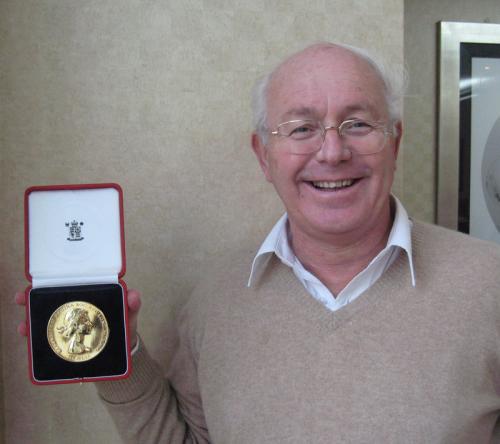
Royal Medal crowns annus mirabilis for Dundee scientist
Sir Philip Cohen, Director of the Medical Research Council's Protein Phosphorylation Unit, Royal Society Research Professor at the University of Dundee, and Director-Designate of the newly established Scottish Institute for Cell Signalling (SCILLS), has been awarded the Royal Society's prestigious Royal Medal.
Professor Cohen was the fourth scientist in his Unit to receive an eminent award in 2008, making it a particularly special year both for the individual recipients and the Unit as a whole.
The Royal Medal is awarded annually in recognition of the profound implications an individual's research findings have for others, and has been granted this year to Professor Cohen for his contribution to our understanding of the role of protein phosphorylation in cell regulation. Protein phosphorylation is a control mechanism in cells, and abnormalities in the mechanism are a cause or consequence of many serious conditions including cancer, diabetes and inflammatory disease.
On hearing of his award, Professor Cohen said: "I am delighted to have received this honour which is only awarded to one scientist in the UK biological sciences community each year. Coming so soon after my recent election to the US National Academy of Sciences, this has been quite a year for the MRC Protein Phosphorylation Unit at Dundee - Dario Alessi was elected a Fellow of The Royal Society, John Rouse received the Colworth Medal of the Biochemical Society and Kei Sakamoto was honoured with the Young Investigator Award of the American Physiological Society."
Professor Cohen has been honoured 37 times during his career, and his honours include degrees, fellowships, awards and medals. In the last three years alone, Professor Cohen has received the Queen's Anniversary Award for Higher Education, the Rolf Luft Prize (Sweden) and the Debrecen Award for Molecular Medicine (Hungary), and next year he will receive the Achievement Award of the Society for Biomolecular Sciences.
Only three Royal Medals are awarded each year, for the most important contributions to the advancement of natural knowledge: one in the physical sciences, one in biological sciences, and the third in applied sciences. The Nobel prize winners Frederick Sanger, Max Perutz and Francis Crick, among others, have all received Royal Medals during the medal's rich history.
Professor Cohen was the fourth scientist in his Unit to receive an eminent award in 2008, making it a particularly special year both for the individual recipients and the Unit as a whole.
The Royal Medal is awarded annually in recognition of the profound implications an individual's research findings have for others, and has been granted this year to Professor Cohen for his contribution to our understanding of the role of protein phosphorylation in cell regulation. Protein phosphorylation is a control mechanism in cells, and abnormalities in the mechanism are a cause or consequence of many serious conditions including cancer, diabetes and inflammatory disease.
On hearing of his award, Professor Cohen said: "I am delighted to have received this honour which is only awarded to one scientist in the UK biological sciences community each year. Coming so soon after my recent election to the US National Academy of Sciences, this has been quite a year for the MRC Protein Phosphorylation Unit at Dundee - Dario Alessi was elected a Fellow of The Royal Society, John Rouse received the Colworth Medal of the Biochemical Society and Kei Sakamoto was honoured with the Young Investigator Award of the American Physiological Society."
Professor Cohen has been honoured 37 times during his career, and his honours include degrees, fellowships, awards and medals. In the last three years alone, Professor Cohen has received the Queen's Anniversary Award for Higher Education, the Rolf Luft Prize (Sweden) and the Debrecen Award for Molecular Medicine (Hungary), and next year he will receive the Achievement Award of the Society for Biomolecular Sciences.
Only three Royal Medals are awarded each year, for the most important contributions to the advancement of natural knowledge: one in the physical sciences, one in biological sciences, and the third in applied sciences. The Nobel prize winners Frederick Sanger, Max Perutz and Francis Crick, among others, have all received Royal Medals during the medal's rich history.

